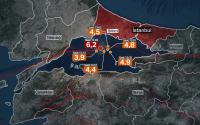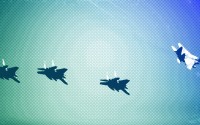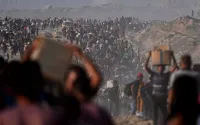21 July 2006Brian WhitakerThe catastrophic scale of destruction inflicted on Lebanon's infrastructure and economy by the Israeli bombardment was becoming apparent yesterday as government officials released details to the Guardian of the damage so far.
With countless homes wrecked, 55 bridges destroyed and numerous roads made impassable, factories, hospitals and airports hit and fuel storage facilities destroyed, estimates of the reconstruction cost already run into billions of dollars.
"We know the cost is in billions," a government spokeswoman said yesterday. "But it's very difficult to estimate more precisely because there are many places we can't reach."
The prime minister, Fouad Siniora, has already said he will "spare no avenue" to to obtain compensation from Israel "for the barbaric destruction it has inflicted and continues to inflict upon us".
In imposing an air and sea blockade, Israeli forces have put Beirut airport out of action and damaged two smaller airports, one of them military, and knocked out all the civilian and military radar stations, according to officials.
Israeli forces have also attacked three of the country's main seaports - Beirut, Tripoli and Jamil Gemayel - as well as putting Beirut's lighthouse out of action and hitting an antenna in Tripoli that was vital for maritime operations.
The energy sector has been hit too, with the destruction of 17 fuel stores, four gas stores and the bombing of 12 petrol stations. An electricity generator in Sibline has also been damaged.
Various factories and warehouses have been destroyed or put out of action. Last night the social affairs minister, Nayla Mouawad, singled out two she said had been wrecked "on purpose". One was a milk plant in the Bekaa valley.
"It was our biggest milk factory in the Bekaa ... an essential asset for bringing milk to newborn babies and young children," she said.
The other was a detergent and foodstuffs warehouse for Procter & Gamble, which she described as "essential for food and hygiene".
Lebanon had also been expecting more than 1.2 million tourists - mainly wealthy Gulf Arabs and people of Lebanese descent - this summer. "It was going to be brilliant," Ms Mouawad said. "We were expecting an income of $2.5bn to $3bn [£1.3bn to £1.6bn], which was necessary to start repaying our debts."
Some hotels have temporarily closed, although others in Beirut have been full over the past few days with Lebanese fleeing the Israeli onslaught and foreigners awaiting evacuation.
Many shops and other small businesses have also closed, either through lack of customers or because staff can no longer travel to work.
According to Sami Haddad, the minister of economy and trade, Lebanon has enough essential supplies to last two months. The government's prime concern is food - especially getting flour and grain to outlying villages.
"Any large transportation vehicles are being bombed ... There is difficulty getting flour to some villages," he said.
Besides securing food supplies, the government's other main objective is to keep the price of essential goods stable.
Despite the attacks on fuel stores, Mr Haddad said supplies of petrol and diesel were "more than adequate" for the time being. To conserve fuel, though, electricity is being cut off in Beirut for six hours a day.
"Our fuel will last 45 to 60 days on this basis," the minister said.
In the meantime, the Lebanese government has launched a diplomatic initiative aimed at bringing in fresh supplies through the Israeli-imposed blockade.
There have been contacts with the US, Britain and France, and Lebanon is seeking international protection for transporting essential goods.
"We are asking for a humanitarian corridor to link Lebanon with the rest of the world - and a corridor within Lebanon to bring assistance to most of the villages in the south which are cut off from the rest of the country," Ms Mouawad said. "They are poor villages and they are lacking everything."
In one attack on Monday, Israeli missiles hit a convoy near the town of Zahle as it approached Beirut from Syria. Three trucks were damaged or destroyed, as well as four passenger vehicles.
Journalists at the scene reported that the trucks had contained supplies of medicines, vegetable oil, sugar and rice. The Red Crescent Society of the United Arab Emirates said in a statement that the convoy had included medical supplies and medicines, as well as several ambulances. Officials in the UAE also said the convoy was clearly marked as a relief operation.
The mass exodus from Lebanon has led many people to empty their bank accounts, raising fears of a financial crisis.
The Central Bank has been propping up the Lebanese pound, but according to local press reports there is no need to panic because it has more than $13bn in foreign currency reserves.
By tradition, Lebanon has a dual currency system, and US dollars are in increasingly short supply. Banks have also been restricting cash withdrawals in dollars, with an upper limit of $2,000 to $3,000 a person.
Damage to dateEnergy
· Jiye power station, 20 miles south of Beirut, repeatedly hit; electricity generator hit in Sibline.
· Electricity in Beirut said to be "feeble and flickering", with large areas cut off.
· In south, electrical supply almost completely cut. Estimated total of 750,000 people without electricity.
· Four gas stores hit; 17 fuel stores destroyed; 12 petrol stations bombed. Prices have rocketed sixfold in some cities, such as Tyre.
Water
· Treatment plant hit in Dair al-Zahrani, south of Sidon.
· Two trucks with water drilling equipment destroyed in Ashrafiyeh, Beirut.
Transport
· Of Lebanon's seven airports, Beirut airport out of action (runways damaged, fuel tanks destroyed), Qoleiaat in the north and Riyaq military airport in Bekaa severely damaged. All main civilian and military radar stations out of action.
· Three main seaports - Beirut, Tripoli and Jamil Gemayel - hit. Maritime operations antenna hit in Tripoli; Beirut lighthouse out of action.
· 38 main roads severely damaged from the air, including road to Damascus.
· 55 bridges destroyed, mainly those running to southern Lebanon.
Medical care
· Two hospitals hit, one in Nabatiyeh and one in the southern suburbs of Beirut; at least one destroyed (Mayss al-Jabal).
· Convoy of donated medical goods hit near Zahle.
Communications
· Hizbullah's Al-Manar TV station in Beirut hit.
Industry
· Liban Lait milk plant in Bekaa hit.
· Tissue paper factory in Sidon attacked.
· Paper mill in southern Beirut hit.
· Medical supplies company in southern Beirut hit; grain silos hit at port.
· Warehouse of Transmed company in Beirut caught fire; $10m losses.
· Stores of Procter & Gamble products hit in Choueifat.
Economy
· Stock market closed on Monday after falling 14%.
· Banks limit withdrawals by panicked customers to $1,000. Central bank keeping currency stable, say dealers.






